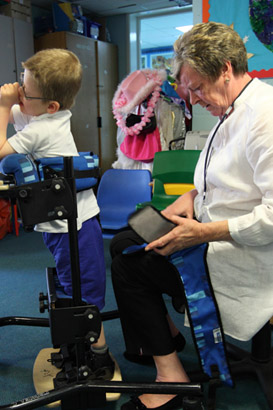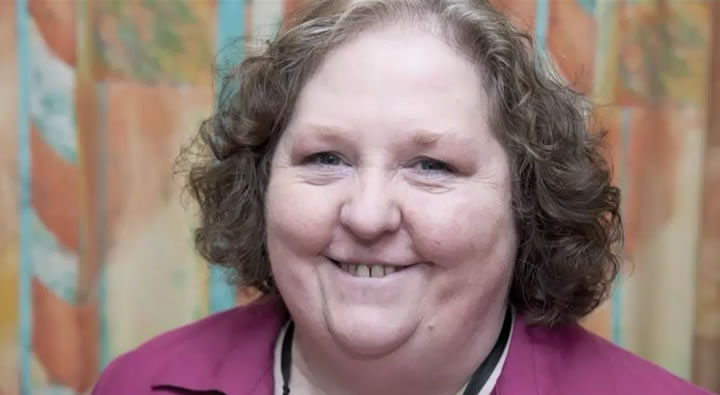Primary care services and GPs are the first points of contact for most medical services. GPs provide a wide spectrum
of care within the local community comprising physical, psychological and social elements.
GPs work in teams with other professionals, such as health visitors, practice nurses, district nurses, community psychiatric
nurses, community learning disability nurses and social workers to help patients manage their own health and that of their
family. Partnership and collaborative working is key to ensuring effective outcomes.
Some GPs develop special interests in areas such as obstetrics and paediatrics, thereby enabling them to meet needs within primary care and provide support for families. Some children with learning difficulties and disabilities experience health needs that require treatment from primary care services such as chest infections associated with gastric aspiration and epilepsy.
In this audio clip Marley's mother talks about some of Marley's health needs.
Reflect on the health needs of the children that you are involved with and make a list of the contributions made by GPs
and the primary care team.
Have a look at this guide to GP services.

Health visitors are key members of the primary care team and have extensive education and experience of working with children
and families. They have a key role in leading and delivering care and support.
Health visitors practice across a child's lifespan and have an important role from pregnancy through to about five years
of age. Their role includes providing education, advice and support about child and family health, child development, minor
illnesses and health promotion. They provide family support in areas such as feeding, child development, toileting and sleep.

Reflect on the time a child first starts school and the importance of having access to information about the needs of
the child and their family circumstances.
Write a paragraph setting out the contributions made by health visitors and their role in supporting collaborative working
with colleagues in education.
All professionals, irrespective of their discipline and area of practice, have a responsibility to protect children from
harm. Effective collaborative working across professional boundaries is core to this. Health visitors have an important
role to play in this regard and work jointly with other professionals as part of their child protection role. The health
visitor’s role involves providing ongoing contact with families while safeguarding arrangements are in place to ensure
families have access to advice and support.
Critically review your policies and procedures in relation to safeguarding children and multiprofessional working. Reflect
on a child protection case that you were involved in.
How did the policies and procedures work effectively to safeguard?
Are there areas where further development and review are required?

School nurses and child health teams provide a range of services and supports that aim to maintain and improve the health and well-being of children and their families. They do this by:
- Carrying out screening programmes.
- Working as part of a team to protect vulnerable children.
- Supporting parents and families by providing information and advice about child development.
- Providing information on substance misuse.
- Administering immunisations and medications.
- Providing health education.
- Providing clinical skills training, such as tube feeding.
- Running health promotion or drop-in surgeries.
- Working as part of a wider child health team.

School nurses play an important role, as part of a wider child health team, in the care of children with complex learning
difficulties and in supporting a range of other professionals. Some nurses are based at a school on a full-time basis while
others provide visiting and sessional input.
Read pages 8-18 of the Department of Health and Department for Education & Skills report
The role of school nurses (2)
-
 Clip 10:39In the first audio clip Lia's mother, Julie, gives a brief description of the support provided by the school nurse.
Clip 10:39In the first audio clip Lia's mother, Julie, gives a brief description of the support provided by the school nurse.
-
 Clip 22:54In the second audio clip a school nurse describes her role in ensuring pupils receive the care they need.
Clip 22:54In the second audio clip a school nurse describes her role in ensuring pupils receive the care they need.
Child health services
-
 Physiotherapist1:05
Physiotherapist1:05 -
 Educational audiologist 11:56
Educational audiologist 11:56 -
 Educational audiologist 22:35
Educational audiologist 22:35
To ensure that the needs of children and families are effectively met, the knowledge and skills of a wide range of professionals
are required. All have an important role to play in providing assessment, treatments, interventions, education and support.
Listen to the three audio clips about the contributions made by a community physiotherapist and educational audiologist.
Review and add to the list below, identifying the full range of professionals that are involved where you practice. Using the headings on the right, identify their key involvement:
| Professionals | Area of involvement |
Paediatricians |
Assessment |

Anning A., Cottrell D., Frost N., Green J. and Robinson M. (2006) Developing Multiprofessional Teamworking for Integrated Children's Services. Maidenhead: Open University Press.
Gani R. and Woolley C. (2009) Child protection: Basics of recognition and referral. The Foundation Years 5 (2) 76-80.
Lindsay M. (2002) Comprehensive health care services for people with learning disabilities. Advances in Psychiatric Treatment 8 138-147.
